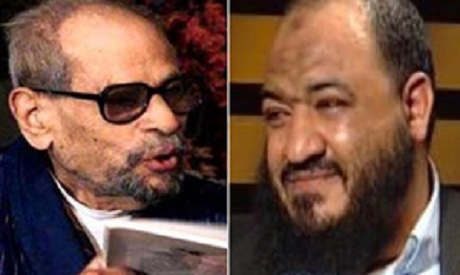
Salafist preacher Abdel-Moneim El-Shahat (right) and Nobel winner Naguib Mahfouz (left) (Photo: Al-Ahram)
Salafist leader and Alexandrian parliament candidate Abdel-Moneim El-Shahat described the literature of Egyptian Nobel prize winner Naguib Mahfouz as “inciting promiscuity, prostitution and atheism.”
El-Shahat reiterated his opinion regarding Nobel prize novelist Naguib Mahfouz in a TV interview on Thursday night, elaborating that Mahfouz’s novels “are mostly set in areas involving brothels and drugs.” He went on to describe Mahfouz’s acclaimed novel Awlad Harretna (Children of our Alley), one of the books that earned him a Nobel prize in 1988, as a novel whose “symbols promote atheism."
El-Shahat’s statement propelled a reaction of alarm among Egypt’s liberals and intellectuals. Some considered the statement a reminder of the dangers that freedom of expression is likely to face in Egypt should the Islamists take power.
Novelist and critic Howeida Saleh reacted strongly to El-Shahat’s latest televised statement: “We have long stressed [during the old regime] the importance of respecting democracy and giving Islamists the opportunity to demonstrate their cultural and political approach; but we [Egyptians] have not had a revolution so that the likes of El-Shahat come to smear our cultural symbols and call us atheists as soon as they [Islamists] start rising to power.”
Contemporary novelist and literature professor Sahar El-Mougy argued that it would be useless debating with El-Shahat and other ultra-Islamist figures over matters concerning arts and culture. It would overshadow, he says, the important questions they should be asked, instead, such as their economic and social plans for the country.
Author Ibrahim Abdel-Meguid, however, believes that the intellectual community is overreacting to El-Shahat’s statement. Abdel-Meguid says dismissively that Abdel-Meguid is “tuned into a time a thousand years ago,” and that he takes El-Shahat’s statements only with pity.
Other statements by El-Shahat, the official spokesperson for the Salafist umbrella group, the Salafist Call, have sent just as many chills up the art community’s spine.
For instance, he is notorious for his statement that Pharaonic monuments should be covered up because, according to El-Shahat, they are from a “rotten” culture that does not worship God. This also caused outrage among archaeologists as well as those who work in the tourism sector, who have further accused him of sabotaging one of Egypt’s main sources of revenue.
El-Shahat also denounced those who promoted democracy, and not God's word represented by Sharia (Islamic Jurisprudence), as atheists.
El-Shahat will be facing Hosni Mohamed Taha, who is supported by the Muslim Brotherhood, in a run-off election for a single-seat in Alexandria in the first phase of Egypt's parliamentary vote on Monday 5 December.
Short link: